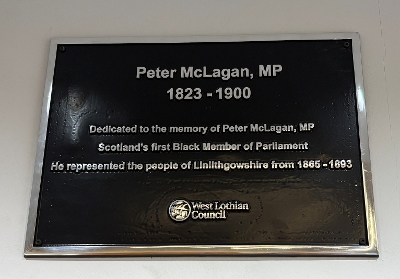Tribute to Scotland's first Black MP
A special plaque has been put up in memory of Scotland's first Black Member of Parliament, Peter McLagan.

McLagan was first elected to the represent Linlithgowshire in 1865 and served until 1893, making him West Lothian's second longest serving MP after Tam Dalyell.
The plaque will be permanently mounted in Council Chambers at West Lothian Civic Centre, and was recently unveiled along with special interpretation panels telling McLagan's fascinating life story during Black History Month in October.
Provost Cathy Muldoon said: "It's fantastic to see this permanent tribute to Peter McLagan put in place in West Lothian.
"We hope this will encourage more people to learn about McLagan's interesting life and achievements, and inspire more West Lothian residents from minority backgrounds to consider standing for election to represent their area."
Silence Chihuri, co-chair of the West Lothian Legacy of Chattel Slavery Working Group, added: "I am pleased that West Lothian Council have followed up on their commitment to fulfil one of the most important recommendations from the working group report.
"Celebrating Peter McLagan in this way gives significance to the contribution of Black people to the development of West Lothian."
Peter McLagan was born in Demerara in 1823 to a white plantation owner and merchant father and black mother, about whom few details are known. The family returned to Scotland where Peter's father received compensation for freeing slaves from their plantations in Demerara, which enabled him to buy a country house in Calderbank and the adjoining estate of Pumpherston.
Peter graduated with a degree in science from Edinburgh University, and was well-known as agricultural expert at the time. He inherited the Pumperston estate and a large fortune when his father died, and was involved in the shale oil industry after shale reserves were discovered on his property.
McLagan's standing in both the farming and shale oil industries saw him asked to stand for the Linlithgowshire constituency in 1865, where was elected unopposed as an Independent MP.
He remained as MP until 1893, when he resigned after being declared bankrupt following a bad investment. Peter lived his final years in London until his death in 1900, and is buried in Mid Calder Churchyard.
The distinctive McLagan Fountain has stood in Bathgate town centre since 1878, after being gifted to Bathgate residents by Peter's wife, Elizabeth McLagan, to provide easy access to clean drinking water for the town.
Although no longer used as a fountain, the landmark still remains in Bathgate's Steelyard, and was recently renovated by the council.




